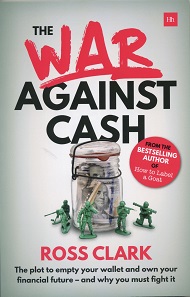by Ursula Kampmann
translated by Christina Schlögl
April 5, 2018 – It’s so advanced: You are standing at the checkout, you swing your credit card and the bill is paid within seconds. No jingling coins in the pockets. No annoying rummaging for change. A modern person only needs their mobile and their credit card to pay.
Ross Clark, The war against cash. The plot to empty your wallet and own your financial future – and why you must fight it. Harriman House, Petersfield 2017. 14 x 21.6 cm. 177 p. Paperback. ISBN: 978-0-85719-625-5. 12.99 GBP.
Only few people realise that this leads to a string of consequences. Cash money does not have a lobby, after all. The media are dominated by those who expect fantastic business with the financial transactions of entire nations. The fight against cash money is quite bizarre – Ross Clark shows just how bizarre. He is an extremely successful journalist in Great Britain who has made nonsense of many modern myths in different books. His bestseller ‘How to Label a Goat’ reveals some of the preposterous legal requirements of Great Britain in plain language. He also became known for writing ‘The Great Before’, a satire on the anti-globalism movement. Clark’s books are amusing to read, swim against the stream and tell you things you will probalby never read in the mainstream media.
Clark’s latest book begins with a situation, everyone knows in some way or another: Clark tries to park his car. He can only pay with a programme called RingGo (which I am sure is hugely common in Great Britain). After fifteen minutes, he realises that he is supposed to upload intimate bank details via an unsecured internet connection. His only choice is to find another parking site.
And this is where the author starts: Why the hell would anyone think that this could be convenient? Who are the victims of a dicline of cash money? Who are the winners? And who are the driving forces behind this movement? Are their arguments actually convincing? How about the security of these praised cashless transactions? And who wants all of this anyway?
Whoever reads the book will admit that the author is correct. With every sentence. And that he is fighting against two heavenly powers at once, namely human greed and human laziness. He is fighting against greed, because there is a lot of money to be made with the digital purse. He is fighting against human laziness because those who exercise power in the economic system can manage digital income with much less effort than real income.
The matter starts to get questionable when communal suppliers with a monopoly, who should be committed to common wealth, force their customers to choose their cashless way.
And if you think, cash payment is still guaranteed everywhere just try to spontaneously buy a ticket in a London bus – with cash or with a credit card. And if you think the English-speaking world is far ahead of the German one, I will tell you, just how many stops of the Zurich trams will only let you buy a ticket with a credit card.
In a democratic society, ‘freedom’ should also entail the freedom to choose one’s form of payment. It’s a shame that cash payment is not yet a search criterion at Google or Google Maps.
But this might not be as important to the younger generation anyway: Who needs freedom when they can consume, after all?
Ross Clark’s book has been published at Harriman House.





